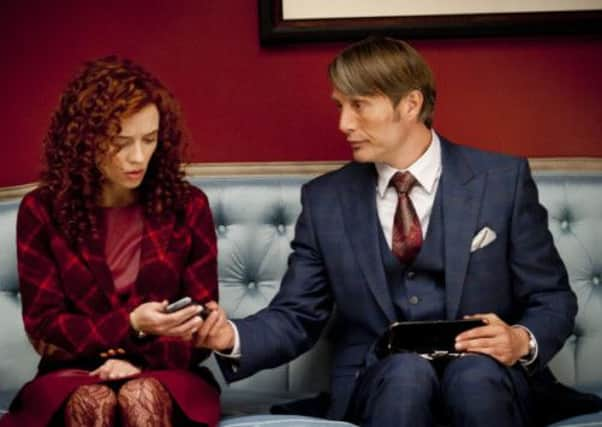Arts blog: Hannibal taking bite out of cinema | Twitter plays


‘The fact that Hannibal’s creative potential is being realised on a small screen is a slap in the face for Hollywood’
IN recent years American television seems to have usurped Hollywood’s ability to create and sustain brilliant drama – and it’s happened again with Hannibal, which began screening in the UK this week. Homing in on Hannibal “the Cannibal” Lecter in the years preceding the events in Red Dragon, this latest iteration of novelist Thomas Harris’s most enduring creation not only rescues Dr Lecter from the ignominy of three creatively bankrupt attempts to cash-in on the success of Jonathan Demme’s Oscar-winning The Silence of the Lambs, it rivals both Demme’s film and Michael Mann’s clinical and chilling Manhunter as Lecter’s most satisfying screen incarnation yet.
Advertisement
Hide AdIts success can be attributed in large part to the casting of Danish star Mads Mikkelsen as Lecter and Brit actor Hugh Dancy as the preternaturally gifted/disturbed FBI profiler Will Graham. Also crucial, though, is the way showrunner Bryan Fuller has used the episodic TV format to build on the hitherto unexplored back-story detailed in Harris’s novel Red Dragon, while exploiting pre-existing audience awareness of the characters is in order to tease out Lecter’s – and Graham’s – psychological nuances.
That’s the sort of thoughtful approach to storytelling that was entirely absent from Ridley Scott’s Hannibal, Brett Ratner’s terrible Red Dragon remake and the absolute nadir of the series, the early years prequel Hannibal Rising (for which Harris must cop a lot of the blame, having adapted the screenplay himself from his own awful novel).
The fact that the franchise’s full creative potential is now being realised on the small screen, however, is a big slap in the face for Hollywood. The annals of US TV history are, after all, littered with the corpses of shortlived shows based on movies that either lacked any sequel potential (Serpico, Working Girl, Ferris Bueller), movies that lack a high-enough profile to hook a TV audience (Out of Sight spin-off Karen Sisco) or movies that have already been franchised to death by the time they arrived on TV (Planet of the Apes, Robocop, the various chronicles of the Young Indiana Jones and The Terminator’s Sarah Connor Chronicles).
Successful anomalies such as M*A*S*H, Buffy the Vampire Slayer or, more recently, Friday Night Lights, may have long hinted at TV’s power of resurrection, but for the most part, the small screen was where characters made famous by the movies were laid to rest.
Of course, it’s too early to tell if Hannibal is truly a sign that things have changed (the real test may be the forthcoming contemporary set Psycho prequel Bates Motel). But the quality of the series thus far is a sign that while TV and movie executives remain similarly risk averse in their desire to develop mainstream projects with built-in audience awareness, TV now feels better equipped than Hollywood to cannibalise pop culture and, more importantly, do something interesting and nourishing with it. Dr Lecter would surely approve.
• Hannibal is on Sky Living; Bates Motel will be screened in the autumn on Universal.
‘The key to a Twitter play is what isn’t being said’
Advertisement
Hide AdIS it possible to write a play that’s no longer than a Tweet? This week, Edinburgh’s Village Pub Theatre has challenged the Twittersphere to have a go, and those who have already risen to the challenge include well-known Scottish playwrights such as Linda McLean and David Greig.
Here’s one of Greig’s contributions:
You awake?
Mm.
Cold tonight.
…
…
Was that a mammoth?
Mm.
Maybe just wind, trees.
…
Shirley was funny tonight eh?
Brian
Mm?
Shh.
Some are taking the task more seriously than others. But the result has been a flurry of invention. One of my favourites is by Andy Field – who, as co-director of annual festival the Forest Fringe, is accustomed to creating unconventional new forms of theatre. Here’s Field’s Twitter play.
In the theatre bar
All night
Two performers arguing
Over where they should
Mark utopia
On their map.
Advertisement
Hide AdThis, some might say, is cheating, being a brief set of open-ended stage directions rather than a complete play. Then again, why should a play have to consist of set dialogue? Why can it not be something else entirely? Like this…
Woman, pale, places empty pill bottle on bedside table, lies back on bed, closes her eyes. Long pause. Phone rings endlessly. Fade.
…which is a little bleak, perhaps, but also a smart response to an obvious challenge inherent in the task. A play should aspire to have emotional depth and resonance – otherwise it is just a skit – but how do you achieve that in just 140 characters? Perhaps by writing something like this, by Oliver Emmanuel.
This is it.
Yeah?
Yeah.
I’m not sure it will work.
Has to.
But -
But nothing.
…
…
Go on then.
Sure?
Yeah.
Okay.
(Hold hands)
Admit it, you’re intrigued. Who are these people? Something important is clearly at stake here – the final line, in particular, suggests this is a life or death situation, something there will be no going back from. As with all great drama, what is not said is just as important – perhaps far more important – than what is said. And perhaps that’s the key to creating a good Twitter play – creating a situation where what isn’t said is so tantalising that the full play is not so much what is in the Tweet, more the story you are writing inside your own head.
• If you’re on Twitter, you can find the plays by using the hashtag #vpt. If you’re in Edinburgh, you can watch the best ones being performed at the Village Pub, South Fort Street, at 7.30pm tomorrow night.